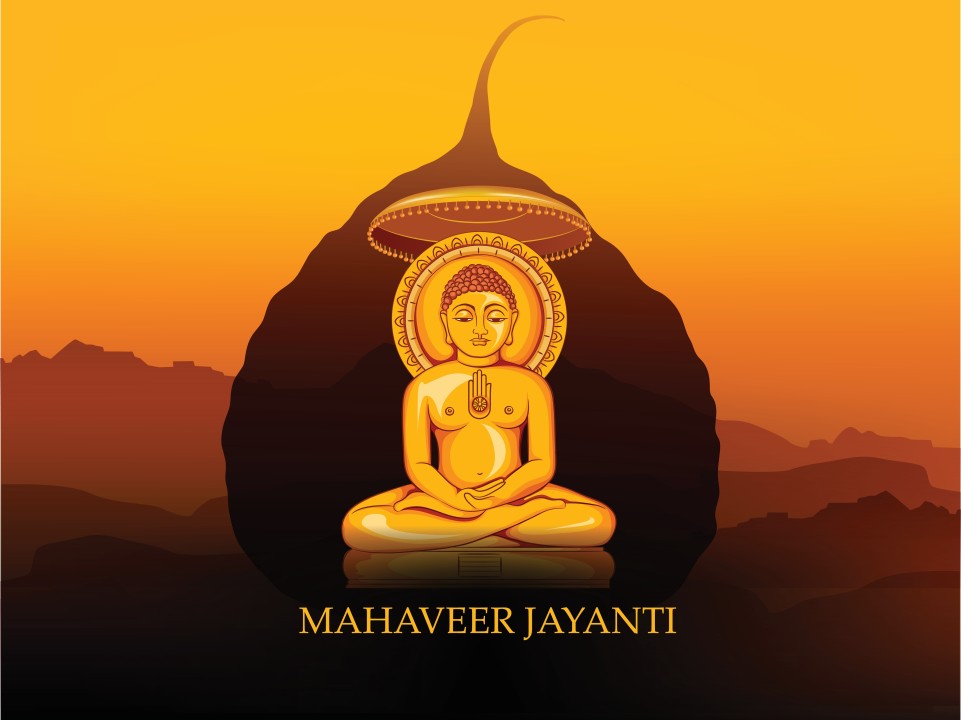Mahavir Jayanti is a significant Jain festival that marks the birth of Lord Mahavir, the 24th Tirthankara. It is celebrated on the 13th day of the Chaitra month, which falls on April 10th in 2025, this year, according to the Gregorian calendar. On this sacred day, Jain temples are beautifully decorated, and special religious ceremonies like puja (worship) and abhisheka (the ritual bathing of idols) are performed with extreme devotion. Many followers observe fasts and participate in acts of kindness and charity. They often distribute food, clothes, and other essentials to those in need, reflecting Lord Mahavir’s teachings of compassion, generosity, and self-discipline.
In This Article:
Why Is Mahavir Jayanti Celebrated?
Lord Mahavir was born in 599 BCE as Vardhamana in Kundagrama, near present-day Vaishali in Bihar, India. He belonged to a royal lineage—his father was King Siddhartha, and his mother was Queen Trishala. Despite his upbringing amid wealth and comfort, Vardhamana showed a deep spiritual inclination from an early age. By the age of 30, he gave up his life as a prince and started an ascetic lifestyle because he had a strong desire for truth and freedom. He led a life of self-denial, meditation, and intense discipline for twelve years. He eventually achieved Kevala Jnana, or supreme knowledge, through unflinching perseverance, and as a result, he became a Tirthankara, a spiritual teacher who helps others find their way to emancipation. From that point onward, he was known as Mahavir, meaning “the great hero.”
In Jain philosophy, the teachings of Lord Mahavir serve as the foundation, which has the following values: Brahmacharya, Aparigraha, Ahimsa, Satya, and Asteya.
Observance And Celebrations
It is celebrated with enormous devotion not only across India but also by Jain communities around the world. The day usually begins with prayers in Jain temples, followed by processions known as Rath Yatras, where beautifully decorated chariots carry the idol of Lord Mahaveer through the streets. Many devotees also participate in Prabhat Pheris—early morning walks where they sing devotional songs and share stories about Lord Mahaveer’s teachings and noble deeds. Special talks and lectures are held in temples and community halls, where religious leaders and scholars speak about Lord Mahaveer’s teachings to encourage people to live in peace. Acts of charity are an important part of the celebration. Many people choose to fast as a form of spiritual discipline, while others engage in seva (selfless service) by distributing food, clothes, or other essentials to those in need. Jain temples are beautifully decorated for the occasion, and rituals such as Abhisheka—the ceremonial bathing of the idol—are performed with extreme devotion and care.
Relevance in Today’s World
Lord Mahavir’s teachings hold immense significance for people of all faiths, not just followers of Jainism. In today’s world, where we face challenges like violence, injustice, and environmental damage, his principles offer timeless wisdom. His core values—non-violence, simplicity, truthfulness, and compassion for all living beings—serve as powerful tools to create a more peaceful and harmonious society. By following these teachings, individuals can contribute to a world that is not only kinder and fairer but also more sustainable and safe for future generations. Lord Mahavir’s message continues to inspire those who seek peace, equality, and respect for all forms of life.
Thus, concluding, Mahaveer Jayanti is not only a religious festival but also a day to consider the timeless principles that Lord Mahaveer promoted. As social media interconnects the world, we should encourage and preach devotional spiritual paths to younger generations. One should nurture every year the principles of non-violence, truth, compassion, ethical conduct, and spiritual awareness.
By – Pavithra



